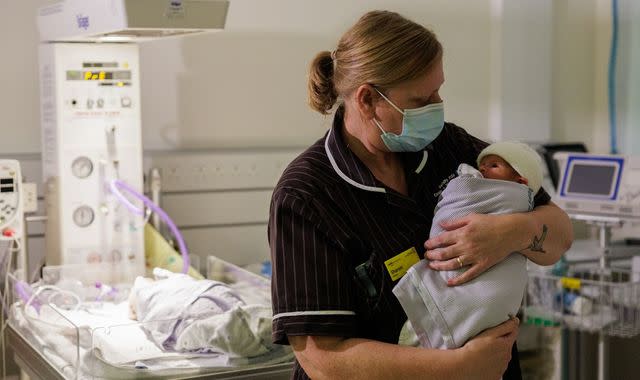Pensioners and new mums relieved to get treatment as NHS struggles with strikes and surging infections

Baby Shylo is just a few hours old. She was born three weeks prematurely in Coventry Hospital and is one of the National Health Service's newest patients.
But her first breaths, touches and tears will be experienced in a system that has already been looking after her for months.
She was born in the midst of an NHS winter crisis, with hospitals struggling against surging demand and crippling industrial action. These thoughts raced through her mother Yvonne Amankwa-Mainu's mind as she prepared for her baby's arrival.
"It makes you nervous, yeah", Mrs Amankwa-Mainu said. "Because you know you're using that service. You're going to need that service at one point in pregnancy. So it makes you nervous. You know, every time you go into hospital, you're thinking oh, is it gonna? Am I going to be the next person?"
The NHS is struggling with the surge in flu and COVID cases and with the rebound of seasonal respiratory illnesses. On top of that it has to deal with strikes by nurses and ambulance workers.
Mrs Amankwa-Mainu has no doubt about whose side she is taking in this dispute.
"The government needs to listen to doctors and nurses and people in the NHS and really sort it out," she says unequivocally.
Shylo and her proud mother are under the watchful eye of midwife Channel Griffiths.
Her department, she says, like everywhere else in the NHS is struggling to deal with workforce shortages. There are other factors too. Ms Griffiths says her expectant mothers are getting older and with more underlying health conditions.
"We need more midwives," Ms Griffiths says.
"There are a lot more women now having children that have a lot more comorbidities and things like obesity. They've also got a chronic history of diabetes and high blood pressure, which makes them more high risk at the beginning of their pregnancy."
Since its creation 75 years ago, the NHS has brought more than 52 million babies into the world.
'I thought I was going to die'
Edwina Jones was born before the NHS was created. On Saturday night it saved her life.
She was rushed to Coventry Hospital with paramedics doing everything to keep her alive despite the 78-year-old grandmother fearing the worst.
"I thought I was going to die," Mrs Jones says, matter-of-factly.
Mrs Jones had been struggling to get an appointment with her GP, her health was becoming worse and then she fainted.
Read more:
Ambulance delays in December meant 6,000 suffered 'severe harm'
Baby who died 23 minutes after birth 'failed in most cruel way' by NHS trust, says mother
NHS crisis: Elderly man waits days in pain at home 'because TV said only call 999 if life or death'
Her granddaughter called an ambulance which responded in minutes. Her arrival at hospital had been anticipated and a bed was waiting for her.
Unknown to Mrs Jones she had suffered a heart block and her health was deteriorating quickly. The speed of the medical intervention was crucial, otherwise the outcome would have been very different.
Sitting upright in a chair next to her bed, two operations later and with a pacemaker fitted, Mrs Jones is almost ready to go home.
"I've got to praise," she says before pausing to reflect on the challenges facing the NHS. "I'm glad our lot weren't on strike. I'm glad, because I don't think I'd be here to talk to you if our lot were on strike."
The NHS is a life-saving, life-welcoming service in crisis. In need of reform, staff and answers.

 Yahoo News
Yahoo News 